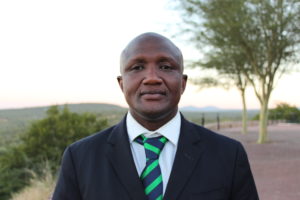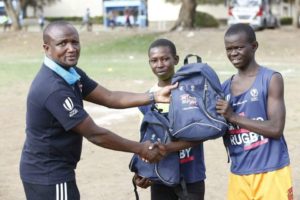
1. What is Get into Rugby?
Get into Rugby (GIR) programme is a mass participation programme initiated by World Rugby in partnership with member unions and Regional associations. The GIR strategy is to grow the game globally. The aim is to encourage players of all ages to try, play and stay in rugby. The programme promotes the values of the game and encourages children to try the game in a safe and a progressive manner. Through this programme, over 3.5 million children have been introduced into the game, in Africa. Get into Rugby is split into three progressive phases:
TRY: Introducing children to the principles and values of Rugby for the first time, through modified non-contact rugby
PLAY: Developing players’ skills, building their Game
STAY: Keeping the players in the Game for life.

2. How has the pandemic affected the program in Africa?
Following the outbreak of the COVID-19, governments across the continent imposed a ban on sports activities to minimise the spread of the disease. Consequently, our unions had to stop the GIR activities. As expected, that impacted negatively on the progress of the programme and the momentum that had been gathered over the years. Nonetheless, the safety of the players and the coaches is of paramount importance hence the decision being as difficult as it was, had to be respected. Good news is that some governments have started to ease some of the restrictions allowing unions to practise a progressive return to GIR activities.
3. May you elaborate on how GIR will be managing a mass participation programme amid the unique challenges experienced in Africa. From the perspectives of unions and all relevant parties
Africa’s challenges include availability of resources and the perceptions communities and parents have about rugby. Therefore, the first step is to make the programme attractive by allowing all children access (not just a few privileged ones), ensuring sessions are fun, turning values into virtues through storytelling, healthy eating and addressing the physical, social, and emotional welfare of the children. Secondly, availability of resources could be addressed with a school approach, utilising teachers, and volunteers as coaches, linking resources to coaches rather than schools and teams, and making use of the game-based approach in coaching.
4. To prepare for a successful restart of the Get Into Rugby program in Africa, Rugby Africa is hosting online workshops. Tell us more
As governments continue to relax COVID -19 restrictions, most unions are progressively implementing return to play protocols. In anticipation of the return to Get into Rugby activities, Rugby Africa is organizing online workshops to prepare Unions’ Get into Rugby Coordinators and their respective RDOs and coaches towards a safe return to play. Through online workshops we can host a group of participants, drawn from the respective unions’ GIR workforce to interactive sessions. So far, two workshops have been held: on 12th February and 18th February 2021. During the first webinar, participants were given an update on the World Rugby’s new Get into Rugby strategy. World Rugby is currently reviewing the GIR strategy to align it with World Rugby’s new participation plan. The webinar also focused on managing a mass participation programme amid the unique challenges experienced in Africa. Secondly, the webinar dealt with the topic of Long-Term Player Development with particular attention on skill progression through game- based coaching.
The second webinar focused on Strength and conditioning for children. The use of conditioning games was emphasized. The second topic dealt with coaching children under the COVID-19 situation. Although return to play depends on protocols issued by respective governments, the participants discussed basic protocols to be observed to keep children and coaches safe.
Ninette Kruyt, a South African GIR expert and a World rugby Educator, who facilitated both workshops said “it was such a privilege to be part of the Rugby Africa GIR workshop. There is an eagerness to learn and expand the knowledge on various topics. A shared economy approach will be very beneficial for all. I am looking forward to continuing this rugby journey with the rest of Africa”.
5. May you elaborate on the specific conditioning games that are currently being looked at for the strength and conditioning programme for children? As well as touching base on the protocols to be observed. Additionally, please let us know how girls are faring in this program and are there specific challenges around girls participation and retention? Any advice you could give the Unions to encourage more girls to try rugby?
World Rugby has developed useful online resources which are available on the World Rugby Passport site. Two courses are of particular importance to coaches working with children: the Coaching Children (https://coaching.worldrugby.org/?module=4) and the Conditioning for children (https://sandc.worldrugby.org/?level_landing=3). These courses focus on fundamental rugby skills with regards to playing and conditioning. Additionally, the Get into Rugby introduction course (https://getintorugby.worldrugby.org/?page=85) contains modules designed to take a player with no experience of Rugby progressively form an introductory level to being a player who can enjoy all forms of the game. These resources have a variety of games that can be used to introduce tag, move from tag to tackle, developing contact, introducing set pieces as well as developing technical and tactical understanding of the game. Game-based approached is recommended because games create fun and allow for teaching of more than one skill at a time. Throughout all coaching, safety should always be the number one priority. It is also important to take a progressive approach and move at the pace that fits the players’ needs and skill level.
Girls have great potential, however, the number of girls on the programme does not match that of boys. The limitation has been the opportunities given to them at a young age since in most unions, few schools, communities and clubs support girls rugby. Consequently, girls discover other passions.
Unions can improve the participation of girls through creating equal opportunities for girls and boys. One way this can happen is by lobbying their respective governments to have rugby as part of the school curriculum or co-curriculum activities. As soon as there are opportunities, the love for the game will start growing and so will the interest and potential.

6. What’s next in this GIR online training program?
Future sessions will focus on the following:
a) Coaching children: A holistic approach to develop better rugby players and better people.
b) Implementation of the new World Rugby Get Into rugby strategy.
c) Identification of and building relationships with partners to unlock funding and
d) Get into Rugby coordinators are encouraged to propose other topics relevant to them.
7. What is Rugby Africa doing to assist Unions with the program?
Rugby Africa has engaged Regional Development Officers who assist unions’ by offering technical and administrative support. Secondly, rugby Africa organises and coordinates the support coming from partners such World Rugby and Société Générale who have been very helpful with donation of balls.

